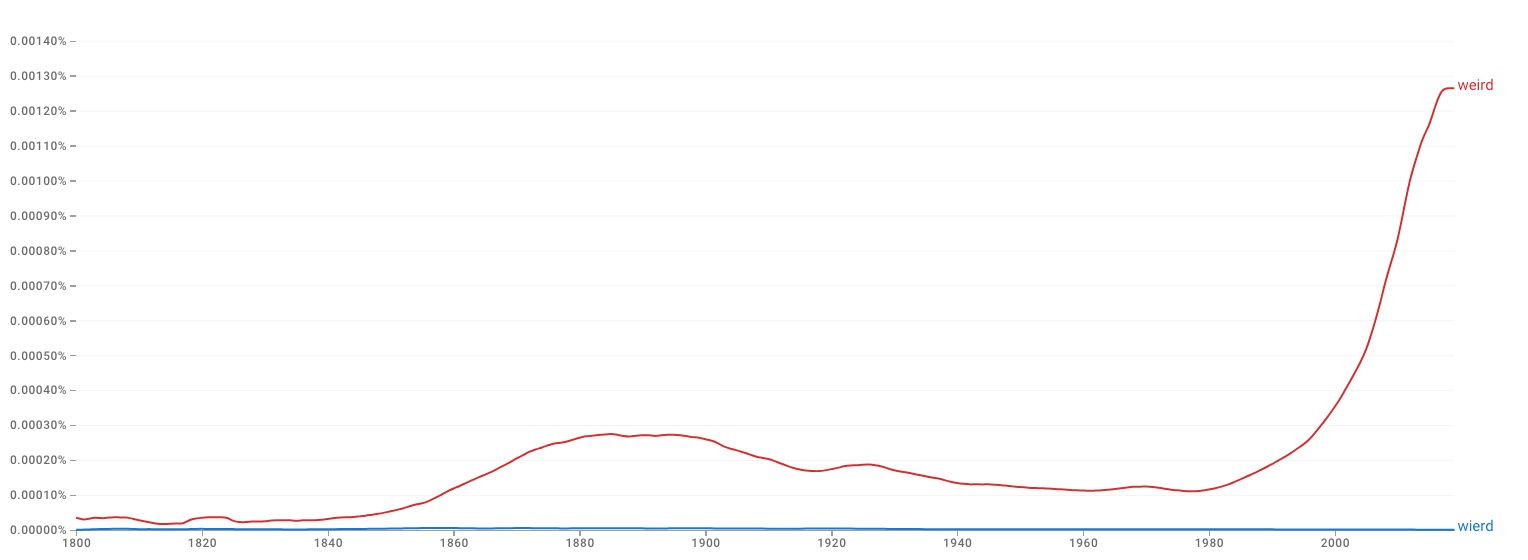"Wierd" is an incorrect spelling of "weird," which means strange or unusual. Let's find out how "weird" doesn't follow widely used English rules.

In short, "weird" is correct while "wierd" is incorrect:
Incorrect: Is it wierd to eat ice cream in winter?
Correct: Is it weird to eat ice cream in winter?
Origin of "weird"
This common misspelling often arises due to the irregular placement of the vowels "i" and "e" in the word. "Weird" originates from Old English, where it was spelled "wyrd" and meant "destiny." Over time, its meaning evolved to describe something uncanny or supernatural. Despite its prevalence in the English language, "weird" remains a word that trips up many writers and spellers.
"Weird" example sentences
Here are some examples of "weird" being used correctly:
- "That movie was so weird. I couldn't follow the plot at all."
- "I had a weird dream last night where I was flying without wings."
- "Isn't it weird how some people can sleep with their eyes open?"
- "The texture of this food is kind of weird, but it tastes good."
- "I find it weirdly satisfying to organize my bookshelf by color."
In each of these sentences, "weird" is used to describe something unusual, strange, or unexpected. It's a versatile word that can apply to various situations and phenomena that deviate from the norm.
The whereabouts of the misspelling "wierd"
The misspelling "wierd" is often seen in informal writing, such as text messages, social media posts, and casual emails. In these contexts, the focus is often on quick communication rather than formal correctness, leading to common misspellings and abbreviations.
"Weird" vs. "wierd" usage

As seen in the Google Books Ngram Viewer, the correct spelling "weird" has been used throughout history with prominence in use in recent years. Meanwhile, the misspelling "wierd" has seen little to no use throughout the years as it is an incorrect spelling.
Why the weird spelling?
One reason for the confusion is the pronunciation of "weird." The "ei" combination in "weird" is pronounced as a single sound, similar to the long "e" sound. However, in many English words, the "ei" combination is pronounced as a diphthong, blending the sounds of "e" and "i" together. This irregularity in pronunciation can lead to misspellings like "wierd," where the "ie" is used instead of "ei."
Furthermore, the silent "e" at the end of "weird" can add to the confusion. Many words in English have silent letters, and learners may struggle to remember which words include them and where they are placed. In the case of "weird," the silent "e" follows the "i" and is not pronounced, but it serves to modify the pronunciation of the preceding vowel, making it a long vowel sound.
I before E except after C
The irregular spelling of "weird" has stumped many English learners who primarily use logic to learn the language rather than instinct. "Weird" breaks the famous English spelling rule "'I' before 'E' except after 'C' or when sounded as 'A' as in 'neighbor' or 'weigh.'"
Let's break it down with examples of each part of the rule.
Words that follow this rule:
- achieve
- believe
- brief
- chief
- field
- fierce
- niece
- relief
- thief
- yield
Notice how the words above all contain an "ie" that is not preceded with a "C."
Except after "C":
- ceiling
- conceive
- deceit
- perceive
- receipt
- receive
Note that all the words above contain an "ei" that is preceded by a "C." This abides by the part of the rule that states "'I' before 'E' except after 'C'" with "C"s before every "ei."
When sounded as "A" as in "neighbor" or "weigh":
- eight
- freight
- neighbor
- sleigh
- weigh
- weight
In this category of word above, the "ei" in each word is pronounced as an "A" sound like the "A" in "say." Thus, they all follow the last part of the rule "'I' before 'E' except after 'C' or when sounded as 'A' as in 'neighbor' or 'weigh.'"
Exceptions
When you're talking English, you can't forget about the endless number of exceptions in the various rules of the language.
Exceptions that include "ie" after "C":
- ancient
- efficient
- glacier
- science
- society
- species
- sufficient
Exceptions that include "ei" not preceded by "C":
- either
- feisty
- foreign
- heist
- leisure
- neither
- protein
- seize
- sovereign
- their
- vein
- weird
Another variation of the rule:
"'I' before 'E' except after 'C' or when sounded as 'A' as in 'neighbor' or 'weigh,' but 'seizure' and 'seize' do what they please."
This variant addresses that there are some exceptions, although it may be misleading in that one may mistakenly conclude that "seizure" and "seize" are the only exceptions.
Also note that all the lists of exceptions above is not fully inclusive, meaning there are also plenty of other words in English that are exceptions to the rule.
In short, it's weird
Overall, while "weird" may be a tricky word to spell due to its irregularities, understanding its meaning and pronunciation can help writers and speakers use it correctly in their communication.

Want to sound like a native speaker?
Engram’s AI-powered grammar checker makes your English sound like a native speaker’s, suggesting natural English expressions on top of fixing grammar, spelling, punctuation, word order, and vocabulary.

Reference:
https://www.oed.com/dictionary/weird_n?tab=factsheet#14859731
https://www.oed.com/dictionary/diphthong_n?tab=factsheet#6616056















